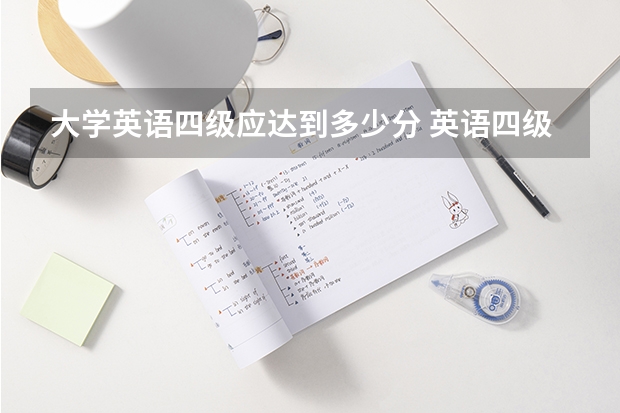大学本科英语四级考试试题 大学英语四级考试听力及答案
2023-09-24 09:08:21 | 蜕变培训网

2020年12月英语四级听力音频(附真题)
12月大学英语四六级考试已经落下帷幕!
快来听听今天四级考试听力部分音频吧!注:本文只有一套听力题目和答案。
2020年12月四级听力音频
?
四级听力真题:
Part Ⅱ Listening Comprehension (25 minutes)
Section A
Directions: In this section, you will hear threenews reports. At the end of each news report, you will hear two or three questions.Both the news report and the questions will be spoken only once. After you heara question. you must choose the best answer from the four choices marked A),B),C) and D). Then mark the corresponding letter on Answer Sheet 1 with asingle line through she centre.
Questions 1 and 2 are based on the news reportyou have just heard.
1.A) A deadly fish has been spotted in theMediterranean waters.
B) Invasive species are driving away certainnative species.
C) The Mediterranean is a natural habitat ofDevil Firefish.
D) Many people have been attacked by Devil Firefish.
2.A) It could add to greenhouse emissions.
B) It could disrupt the food chains there.
C) It could pose a threat to other marine species.
D) It could badly pollute the surrounding waters.
Questions 3 and 4 are based on the news reportyou have just heard.
3.A) cars will not be allowed to enter the city.
B) About half of its city center will be closedto cars.
C) Buses will be the only vehicles allowed onits streets.
D)Pedestrians will have free access to the city.
4.A) The rising air pollution in Paris.
B) The worsening global warming.
C The ever-growing cost of petrol.
D) The unbearable traffic noise.
Questions 5 to 7 are based on the news reportyou have just heard.
5.A) Many of his possessions were stolen.
B) His house was burnt down in a fire.
C) His fishing boat got wrecked on a rock.
D) His good luck charm sank into the sea.
6.A) Change his fishing locations.
B) Find a job in a travel agency.
C) Spend a few nights on a small island
D) Sell the pearl he had kept for years
7.A) A New Year museum
B) The largest pearl in the world weighs
C) His monstrous pearl was extremely valuable.
D) His pearl could be displayed in a museum.
?
Section B
Directions: In this section, you will heartwo long conversations. At the end of each conversation, you will hear fourquestions. Both the conversation and the questions will be spoken only once.After you hear a question, you must choose the best answer from the fourchoices marked A), B), C and D). Then mark the corresponding letter on AnswerSheet 1 with a single line through the centre.
Questions 8 to 11 are based on the conversationyou have just heard.
8.A) It boasts a fairly long history.
B) It produces construction materials.
C) It has 75 offices around the world.
D)It has over 50 business partners.
9.A) It has about 50 employees.
B) It was started by his father.
C) It has a family business.
D) It is over 100 years old.
10.A) Shortage of raw material supply.
B) Legal disputes in many countries.
C) Outdated product design.
D) Loss of competitive edge.
11.A) Conducting a financial analysis forit.
B) Providing training for its staff members.
C) Seeking new ways to increase is exports.
D) Introducing innovative marketingstrategies.
Questions 12 to 15 are based on the conversationyou have just heard.
12.A) She is a real expert at house decorations.
B) She is well informed about the designbusiness.
C) She is attracted by the color of thesitting room.
D) She is really impressed by the man’shouse.
13.A) From his younger brother Greg.
B) From home design magazines.
C) From a construction businessman.
D) From a professional interior designer.
14.A) The effort was worthwhile.
B) The style was fashionable.
C) The cost was affordable.
D) The eft was unexpected.
15.A) She’d like him to talk with Jonathan abouta new project.
B) She wants him to share his renovation experiencewith her
C) She wants to discuss the house decorationbudget with him.
D)She’d like to show him around her newly-renovatedhouse.
?
Section C
Directions: In this section, you will hear threepassages. At the end of each passage, you will hear three or four questions. Boththe passage and the questions will be spoken only once. After you hear aquestion, you must choose the best answer from your choices marked A), B), C)and D). Then mark he corresponding letter on Answer Sheet 1with a single linethrough the centre.
Questions 16 to 18 are based on the passageyou have just heard.
16.A) Providing routine care for small children.
B) Paying hospital bills for emergency cases.
C) Doing research on ear, nose and throat diseases.
D) Removing objects from patients’ noses andears.
17.A) Many children like to smell thingsthey find or play with.
B) Many children like to put foreignobjects in their mouths.
C) Five-to nine-year-olds are the most likelyto put things in their ears.
D) Children aged one to four are often morecurious than older children.
18.A) They tend to act out of impulse.
B) They want to attract attentions.
C) They are unaware of the potential risks.
D) They are curious about these body parts.
Questions 19 to 21 are based on the passageyou have just heard.
19.A) It paid for her English lessons.
B) It gave her a used bicycle.
C) It delivered her daily necessities.
D) It provided her with physical therapy.
20.A) Expanding bike-riding lessons.
B) Asking local people for donations.
C) Providing free public transport.
D) Offering walking tours to visitors.
21.A) It is a language school.
B) It is a charity organization.
C) It is a counseling center.
D) It is a sports club.
Questions 22 to 25 are based on the passageyou have just heard.
22.A) How mice imitate human behavior aspace.
B) How low gravity affects the human body.
C) How mice interact in a new environment.
D) How animals deal with lack of gravity.
23.A) They were not use to the low-gravityenvironment.
B) They found it difficult to figure outwhere they were.
C) They found the space in the cage toosmall to stay in.
D) They were not sensitive to the changedenvironment.
24.A) They tried everything possible toescape from the cage.
B) They continued to behave as they did inthe beginning.
C) They already felt at home in the newenvironment.
D) They had found a lot more activities toengage in.
25.A) They repeated their activities everyday.
B) They behaved as if they were on Earth.
C) They begin to eat less after some time.
D) They changed their routines in space.
?
四级听力答案:
1. A. A deadly fish has been spotted in the Mediterranean waters.
2. C. It could pose a threat to other marine species.
3. B. About half of its city center will be closed to cars.
4. A. The rising air pollution in Paris.
5. B. His house was burnt down in a fire.
6. D. Sell the pearl he had kept for years.
7. C. His monstrous pearl was extremely valuable.
8. A. It boasts a fairly long history.
9. C. It is a family business.
10. D. Loss the competitive edge.
11. A. Conducting a financial analysis for it.
12. D. She is really impressed by the man’s house.
13. B. From home design magazines.
14. C. The cost was affordable.
15. B. She wants him to share his renovation experience with her.
16. D. Removing objects from patients’ noses and ears.
17. C. Five-to nine-year-olds are the most likely to put things in their ears.
18. D. They are curious about these body parts.
19. B. It gave her a used bicycle.
20. A. Expanding bike-riding lessons.
21. B. It is a charity organization.
22. D. How animals deal with lack of gravity.
23. A. They were not used to the low-gravity environment.
24. C. They already felt at home in the new environment.
25. B. They behaved as if they were on Earth.
祝大家顺利通过考试~
相关热点:
四级答案
英语四级听力
职称英语成绩查询

大学英语四级考试听力及答案
23年6月大学英语四级考试听力解析,22-25题,附原文中文翻译
2023年6月大学英语四级考试听力部分,第22-25题,原文是关于午睡价值的科技小文,难度不大,和高考英语听力最后一篇的难度差不多,在大学听力考试里面,应当算作是送分题了。
全文一共出现14处影响理解的词组短语固定用法和难词偏词,《高中英语1.5万考点》和《睡眠记忆法配套词表》全部命中。
听力原文全文翻译:
在“梦想屋”(Dreamery),你可以购买小睡服务,这时在曼哈顿的一个生意。在一个昏暗的封闭空间里,享受宁静祥和的45分钟小睡,需要25美元。要明确一点,这个机构不是一家酒店。这是一个小睡场所。它销售的不仅是小睡本身,还有小睡的理念。
一个小睡值得25美元吗?答案显然是肯定的。现在关于这一点的讨论,我通常会提到所有显示小睡益处的研究。但你真的需要专家来告诉你这个吗?只需要看看下午2:30你周围的世界在干啥。
我已经在家工作超过10年了。我集中注意力的能力直接会影响我所做的工作的质量和数量。我不明白人们如何在没有小睡的情况下从事创意工作。每天大约在下午1点左右,每个人都面临着同样的选择:睡到下午2点,然后工作到下午5点,或者做白日梦,浏览社交媒体,参加毫无意义的会议,直到晚上7点。
我有些朋友仍然在办公室工作,他们告诉我他们的老板坚持让他们选择第二个选项,并认为小睡与懒惰有关。我真的觉得这很奇怪。因为如果你适当地小睡,就像从一个完整的夜间睡眠中醒来一样,你可以让你一天的注意力加倍。
22. 关于曼哈顿的“梦想屋”的生意,我们了解到什么?
23. 说话人为什么要求我们在下午2:30时看看周围的世界?
24. 我们从说话人口中了解到他的工作质量和数量方面的什么情况?
25. 说话人说他觉得什么事情很奇怪?
22 A) 它研究梦境。 B) 它为小睡者租用场所。
C) 它是商务人士的酒店。D) 它是一个小睡研究机构。
23 A) 了解创意人士的工作表现。B) 看看有多少人可以不小睡。
C) 理解小睡显而易见的重要性。D) 感受自己的观点很难传达。
24 A) 由于毫无意义的会议,他们效率下降了。B) 他们依赖于他的专注能力。
C) 它们使他能够享受创意职业。D) 它们受到社交媒体过度使用的影响。
25 A) 一些老板将小睡与懒惰联系在一起。B) 许多办公室的员工在工作时间小睡。
C) 一些老板可以在没有小睡的情况下集中注意力。D) 他的许多朋友在办公室做白日梦。

2014年6月大学英语四级听力真题及答案
再过半个月就要进行英语四级考试了,这时候同学们可以赶紧做做真题来找到考试的感觉,通过做真题你会发现一些规律,找到解题方法。为大家准备了2014年6月英语四级考试听力真题及答案,一起来看看吧!有需要的朋友可以收藏起来!
2014年6月大学英语四级听力真题及答案
Listening Comprehension (30 minutes) Section A
Directions: In this section, you will hear 8 short conversations and 2 long conversations. At the end of each conversation, one or more questions will be asked about what was said. Both the conversation and the questions will be spoken only once. After each question there will be a pause. During the pause, you must read the four choices marked A), B), C) and D), and decide which is the best answer. Then mark the corresponding letter on Answer Sheet 1 with a single line through the centre.
注意:此部分试题请在答题卡1上作答。
1. A. See a doctor about her strained shoulder B.Use a ladder to help her reach the tea. C.Replace the cupboard with a new one. D.Place the tea on a lower shelf next time.
1. W: I can’t seem to reach the tea at the back of the cupboard。 M: Oh„ Why don’t you use the ladder? You might strain your shoulder。 Q: What does the man suggest the woman do?
2. A. At Mary Johnson’s B. In an exhibition hall C. At a painter’s studio. D. Outside an art gallery.
2. W: Since it’s raining so hard, let’s go and see the new exhibits。 M: That’s a good idea. Mary Johnson is one of my favorite painters。 Q: Where does the conversation most probably take place?
3. A. The teacher evaluated lacks teaching experience.
B. She does not quite agree with what the man said. C. The man had better talk with the students himself. D. New students usually cannot offer a fair evaluation.
3. M: I hear the students gave the new teacher an unfair evaluation。 W: It depends on which student you are talking about。 Q: What does the woman imply?
4. A. He helped Doris build up the furniture. B. Doris helped him arrange the furniture. C. Doris fixed up some of the bookshelves. D. He was good at assembling bookshelves.
4. W: It must have taken you a long time to fix up all these book shelves。 M: It wasn’t too bad. I got Doris to do some of them。 Q: What does the man mean?
5. A. He doesn’t get on with the others. B. He doesn’t feel at ease in the firm. C. He has been taken for a fool. D. He has found a better position.
5. W: Rod, I hear you’ll be leaving at the end of this month. Is it true?
M: Yeah. I’ve been offered a much better position with another firm. I’d be a fool to turn it down。 Q: Why is the man quitting his job?
6. A. They should finish the work as soon as possible. B. He will continue to work in the garden himself. C. He is tired of doing gardening on weekends. D. They can hire a gardener to do the work.
6. W: I honestly don’t want to continue the gardening tomorrow, Tony? M: Neither do I. But I think we should get it over with this weekend。 Q: What does the man mean?
7. A. The man has to get rid of the used furniture. B. The man’s apartment is ready for rent. C. The furniture is covered with lots of dust. D. The furniture the man bought is inexpensive.
7. W: You’ve already furnished your apartment? M: I found some used furniture that was dirt cheap。 Q: What do we learn from the conversation?
8. A. The man will give the mechanic a call. B. The woman is waiting for a call. C. The woman is doing some repairs. D. The man knows the mechanic very well.
8. W: Has the mechanic called the bus repairers?
M: Not yet .I’ll let you know when he calls。 Q: What do we learn from the conversation?
9. A. She had a job interview to attend. B. She was busy finishing her project. C. She had to attend an important meeting. D. She was in the middle of writing an essay.
Question: 9. Why couldn’t the woman’s roommate attend the Shakespearean English class that afternoon? W: Nothing, it’s just that she submitted a job application yesterday and the company asked her in for an interview today. She’s afraid she won’t be able to attend your class this afternoon though. I’m calling to see whether it would be OK if I gave you her essay. Janet said it’s due today。
10. A. Accompany her roommate to the classroom. B. Hand in her roommate’s application form. C. Submit her roommate’s assignment. D. Help her roommate with her report.
Question: 10. What favor is the woman going to do for her roommate?
11. A. Where Dr. Ellis’s office is located. B. When Dr. Ellis leaves his office. C. Directions to the classroom building. D. Dr. Ellis’s schedule for the afternoon.
Question: 11. What does the woman want to know at the end of the conversation?
W: Fine, please tell her I’ll be there at 4:00. And Dr. Ellis, one more thing, could you tell me where your office is? Janet told me where your class is, but she didn’t give me directions to your office。
12. A. He find it rather stressful. B. He is thinking of quitting it. C. He can handle it quite well. D. He has to work extra hours.
Question: 12. What does the man say about his job?
M: Not bad, Jane. I’m involved in several projects and it’s a long working day. But I’m used to that so it doesn’t bother me too much。
13. A. The 6:00 one B. The 6:30 one. C. The 7:00 one D. The 7:30 one Question: 13. Which train does the man take to work every day?
M: It was terrible at first, especially getting up before dawn to catch that 6:30 train. But it’s bearable now that I’ m used to it。
14. A. It is an awful waste of time. B. He finds it rather unbearable. C. The time on the train is enjoyable. D. It is something difficult to get used to.
Question: 14. How does the man feel about commuting to work every day now?
W: Don’t you think it’s an awful waste of time? I couldn’t bear to spend three hours sitting in a train every day。
M: I used to feel the same as you. But now I quite enjoy it。
15. A. Reading newspaper. B. Chatting with friends. C. Listening to the daily news. D. Planning the day’s work.
Question: 15. How does the man spend his time on the morning train?
W: How do you pass the time? Do you bring some work with you to do on the train?
M: Ah, that’s a good question. In the morning, I just sit in comfort and read the papers to catch up with the news. On the way home at night, I relax with a good book or chat with friends or even have a game of bridge。
Section B
Directions: In this section, you will hear 3 short passages. At the end of each passage, you will hear some questions. Both the passage and the questions will be spoken only once. After you hear a question, you must choose the best answer from the four choices marked A), B), C) and D). Then mark the corresponding letter on Answer Sheet 1 with a single line through the centre.
注意:此部分试题请在答题卡1上作答。
Passage One
Questions 16 to 18 are based on the conversation you have just heard.
16. A) Ignore small details while reading. B) Read at least several chapters at one sitting. C) Develop a habit of reading critically.
D) Get key information by reading just once or twice.
Question: 16. What should American college students do to cope with their heavy reading assignments?
17. A) Choose one’s own system of marking. B) Underline the key words and phrases. C) Make as few marks as possible. D) Highlight details in a red color.
Question: 17. What suggestion does the speaker give about marking a textbook?
18. A) By reading the textbooks carefully again. B) By reviewing only the marked parts. C) By focusing on the notes in the margins. D) By comparing notes with their classmates.
Question: 18. How should students prepare for an exam according to the speaker?
Passage Two
Questions 19 to 21 are based on the conversation you have just heard
19. A) The sleep a person needs varies from day to day. B) The amount of sleep for each person is similar. C) One can get by with a couple of hours of sleep. D) Everybody needs some sleep for survival.
Question: 19. What is taken for granted by most people?
20. A) It is a made-up story. B) It is beyond cure. C) It is a rare exception. D) It is due to an accident.
Question: 20. What do doctors think of Al Herpin's case?
21. A) His extraordinary physical condition. B) His mother’s injury just before his birth. C) The unique surroundings of his living place. D) The rest he got from sitting in a rocking chair.
Question: 21. What could have accounted for Al Herpin's sleeplessness?
Passage Three
Questions 22 to 25 are based on the conversation you have just heard.
22. A) She invested in stocks and shares on Wall Street. B) She learned to write for financial newspapers. C) She developed a strong interest in finance. D) She tenderly looked after her sick mother.
Question: 22. What do we learn about Hetty Green as a child?
23. A) She made a wise investment in real estate. B) She sold the restaurant with a substantial profit. C) She got 1.5 million dollars from her ex-husband. D) She inherited a big fortune from her father.
Question: 23. How did Hetty Green become rich overnight
24. A) She was extremely mean with her money. B) She was dishonest in business dealings. C) She frequently ill-treated her employees. D) She abused animals including her pet dog. Question: 24. Why was Hetty Green much hated?
25. A) She made a big fortune from wise investment. B) She built a hospital with her mother’s money. C) She made huge donations to charities. D) She carried on her family’s tradition.
Question: 25. What do we learn about Hetty's daughter?
Section C
Direction: In the section, you will hear a passage three times. When the passage is read for the first time, you should listen carefully for its general idea. When the passage is read for the second time, you are required to fill in the blanks with the exact words you have just heard. Finally, when the passage is read for the third time, you should check what you have written.
注意:此部分试题请在答题卡1上作答。
Among the kinds of social gestures most significant for second-language teachers are those which are ___(26)___ in form but different in meaning in the two cultures. For example, a Colombian who wants someone to ___(27)___ him often signals with a hand movement in which all the fingers of one hand, cupped, point downward as they move rapidly ___(28)___ .Speakers or English have a similar gesture through the hand may not be cupped and the fingers may be held more loosely, but for them the gesture means goodbye or go away, quite the ___(29)___ of the Colombian gesture. Again, in Colombian, a speaker of English would have to know that when he ___(30)___height he most choose between different gestures depending on whether he is ___(31)___ a human being or an animal. If he keeps the palm of the hand ___(32)___the floor, as he would in his own culture when making known the height of a child, for example, he will very likely be greeted by laughter, in Colombia this gesture is___(33)___for the description of animals. In order to describe human beings he should keep the palm of his hand ___(34)___to the floor. Substitutions of one gesture for the other often create not only humorous but also___(35)___ moment. In both of the examples above, speakers from two different cultures have the same gesture, physically, but its meaning differs sharply.
1.答案:B Use a ladder to help her reach the tea.
2.答案:D Outside an gallery art.
3.答案:D. New students usually cannot offer a fair evaluation.
4.答案:C Doris fixed up some of the bookshelves.
5.答案:D He has found a better position.
6.答案:A They should finish the book as soon as possible.
7.答案:D The furniture the man bought is inexpensive.
8.答案:B The woman is waiting for the call. 蜕变培训网
9.答案:A She had a job interview to attend
10.答案:C Submit her roommate's assignment
11.答案:A Where Dr. Ellis’s office is located.
12.答案:C He can handle it quite well
13.答案:B The 6:30 one
14.答案:C The time on the train is enjoyable
15.答案:A Reading newspapers.
Section B
Passage One
16.答案:D Get key information by reading just once or twice
17.答案:A Choose one's own system of marking
18.答案:B By reviewing only the marked parts.
Passage Two
19.答案:D Everybody needs some sleep for survival.
20.答案:C It is a rare exception
21.答案:B His mother's injury just before his birth.
Passage Three
22.答案:C She developed a strong interest in finance
23.答案:D She inherited a big fortune from her father
24.答案:A She was extremely mean with her money
25.答案:B She built a hospital with her mother's money
Section C
答案: 26. identical 27. approach 28. back and forth 29. opposite 30. indicates 31. referring to 32. parallel to 33. reserved 34. at the right angle 35. embarrassing
以上就是为大家提供的2014年6月英语四级考试听力真题及答案,希望对您有帮助!想要成功拿下12月份的英语四级,您还需掌握更多考试技巧, CTRL+D 收藏并持续关注本站有惊喜,将竭诚助您考试一臂之力!
猜你喜欢 :
以上就是蜕变培训网为大家带来的大学本科英语四级考试试题 大学英语四级考试听力及答案,希望能帮助到大家!
2015年6月英语四级听力真题答案及解析(含听力音频)2015年6月13日的英语四级考试刚刚结束,本次考试为多题多卷,整理了不同版本的真题及参考答案,供考生参考,下面是整理的2015年6月英语四级听力真题答案及解析(含听力音频),欢迎查看。2015年6月英语四级听力短对话原文1.W:Iamgoingtogiveupplayingchess,Ilostagaintoda

2020年12月英语四级听力音频(附真题)12月大学英语四六级考试已经落下帷幕!快来听听今天四级考试听力部分音频吧!注:本文只有一套听力题目和答案。2020年12月四级听力音频?四级听力真题:PartⅡListeningComprehension(25minutes)SectionADirections:Inthissect

大学英语四级考试听力资料?我们大学时候,听的四级英语听力不在少数,但是否会提升就要看个人努力了。下面是我给大家整理的大学英语四级考试听力,供大家参阅!大学英语四级考试听力素材听力真题:SectionCpoundDictationputersareincreasinglyimportantinhealthcare.Butcantheyalsohelppoorpeopl

大学四级考试阅读训练题及答案?英语阅读是英语四级考试中的重要考察能力之一,只有做好阅读部分的题目才能提高四级考试的成绩。下面我为大家带来大学四级考试阅读训练题,供考生备考练习。大学四级考试阅读训练题***一***Accordingtothedictionarydefinitionof“create”,ordinarypeoplearecreativeeveryday.Tocreate

2014年6月大学英语四级听力真题及答案再过半个月就要进行英语四级考试了,这时候同学们可以赶紧做做真题来找到考试的感觉,通过做真题你会发现一些规律,找到解题方法。为大家准备了2014年6月英语四级考试听力真题及答案,一起来看看吧!有需要的朋友可以收藏起来!2014年6月大学英语四级听力真题及答案ListeningComprehension(30minutes)Section

2014年6月大学英语四级听力真题及答案再过半个月就要进行英语四级考试了,这时候同学们可以赶紧做做真题来找到考试的感觉,通过做真题你会发现一些规律,找到解题方法。为大家准备了2014年6月英语四级考试听力真题及答案,一起来看看吧!有需要的朋友可以收藏起来!2014年6月大学英语四级听力真题及答案ListeningComprehension(30minutes)Section

2019年大学英语四级听力考试题(1-3)2019年大学英语四级听力考试题(2)SectionA1.A)Shewillgopurchasethegiftherself.B)Thegiftshouldnotbetooexpensive.C)Themanisnotgoodatbalancinghisbudget.D)TheyaregoingtoJane’sh

2013年12月大学英语四级考试真题及答案解析下文《2013年12月大学英语四级考试真题及答案解析》由英语频道为您整理,欢迎您访问浏览更多资讯。PartIWriting作文一:Forthispart,youareallowed30minutestowriteashortessaybasedonthepicturebelow.Youshouldstartyou
- 什么是大学英语四六级 是有年龄学历限制的吗
- 2023年6级考试时间下半年(四级报名截止时间2023下半年)
- 求大学英语四级历年真题下载地址,有没有好的推荐(我需要 四六级历年真题,百度网盘的链接有没有呀~求哥哥姐姐们分享)
- 大学几年级可以考英语四级(我是英语专业的,大学几年级考四六级,专四专八?最好具体点,是上半学期还是下半学期?谢谢!)
- 四六级几号考(四六级考试时间 英语听力耳机 济大学一)
- 六级报名和考试时间 英语四级考试 关于英语四六级考试的~~
- 4级和6级满分多少分?
- 大学英语四六级考试写作题型分析及范文(3)(英语六级的书信作文)
- 广东英语四级考试时间(广东省英语四六级考试报名时间)
- 四六级成绩报告单编号是什么意思
- 江苏省2023年四六级考试时间(江苏省四级考试时间2022年下半年)
- 湖北英语四六级考试时间2023 湖北四六级考试时间2023下半年 下半年湖北英语四六级考试安排
-
 大学英语四级考试仍有价值 考英语四六级真的有用吗?
大学英语四级考试仍有价值 考英语四六级真的有用吗?2023-09-16 15:58:42
-
 大学英语四级考试口试题型 大学英语四级考试有哪些题型?
大学英语四级考试口试题型 大学英语四级考试有哪些题型?2023-09-16 02:17:59
-
 大学英语四级考试如何调频率 考四级收音机怎么调频
大学英语四级考试如何调频率 考四级收音机怎么调频2023-09-16 02:05:02
-
 拉萨师范大学英语四级考试 四级英语考试报名时间是什么时候啊?
拉萨师范大学英语四级考试 四级英语考试报名时间是什么时候啊?2023-09-16 02:51:47
-
 大学英语四级应达到多少分 英语四级需要多少分
大学英语四级应达到多少分 英语四级需要多少分2023-09-30 18:46:49
-
 大学英语四级证多少钱 考英语四六级需要多少钱
大学英语四级证多少钱 考英语四六级需要多少钱2023-09-28 20:21:35